背景
接上文:
Spring Data JPA 簡單介紹
本文將從配置解析,Bean的創(chuàng)建,Repository執(zhí)行三個(gè)方面來簡單介紹下Spring Data JPA的代碼實(shí)現(xiàn)
友情提醒:
圖片均可放大
配置解析
1. parser類
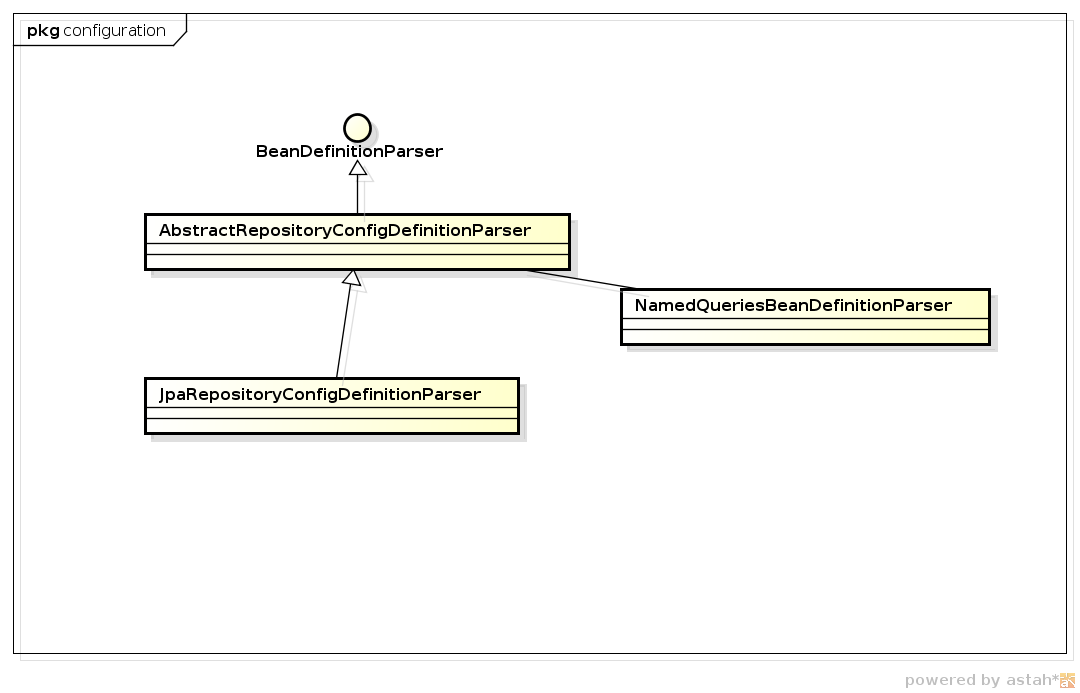 |
Spring通過Schema的方式進(jìn)行配置,通過AbstractRepositoryConfigDefinitionParser進(jìn)行解析。其中包含對(duì)NamedQuery的解析。
解析的主要目的,是將配置文件中的repositories和repository元素信息分別解析成GlobalRepositoryConfigInformation和SingleRepositoryConfigInformation。
詳見下圖 |
2. Information
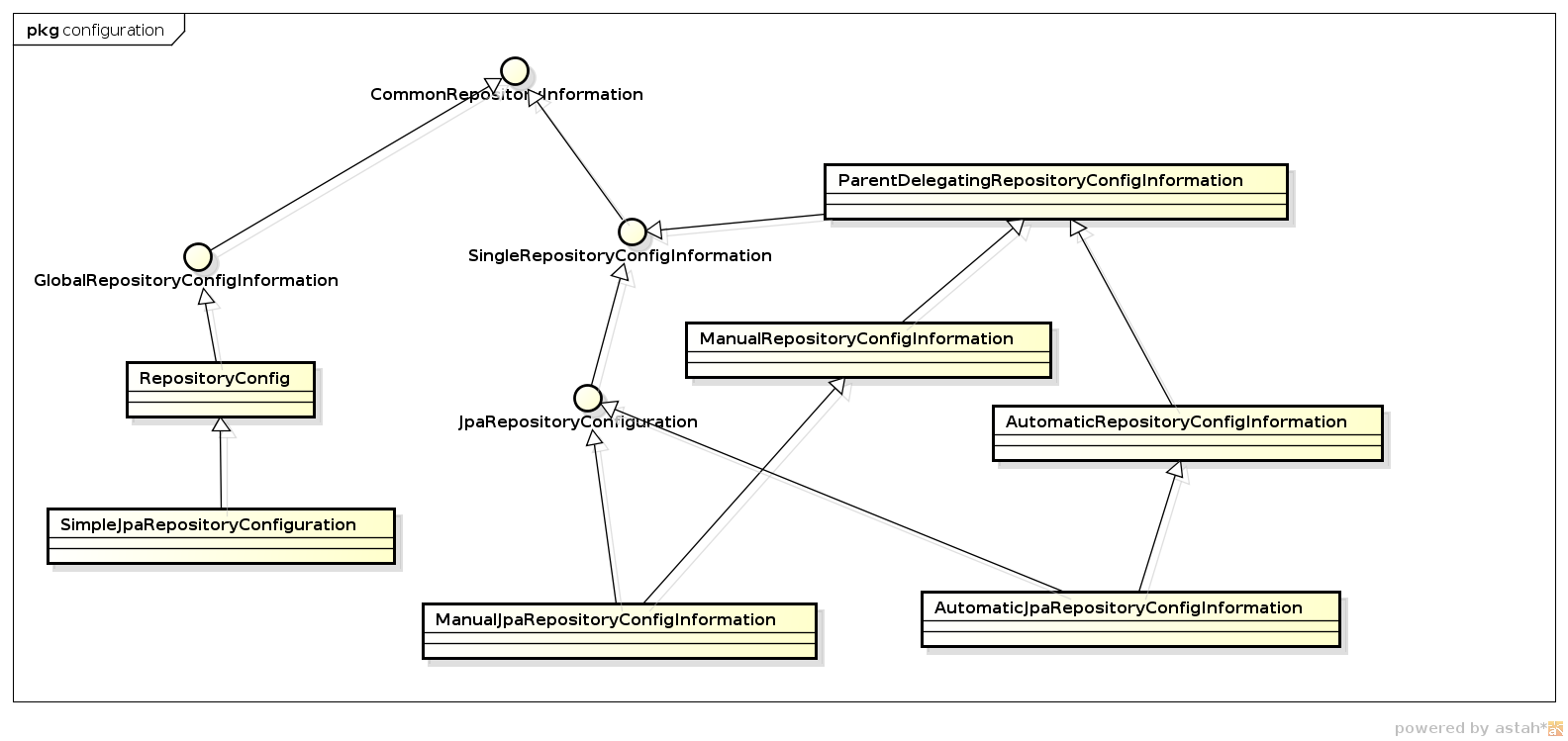
|
CommonRepositoryConfigInformation:
xml中repositories的通用配置,一般對(duì)應(yīng)其中的attributes
SingleRepositoryConfigInformation:
xml中repository的配置信息,對(duì)應(yīng)其中的attributes
GlobalRepositoryCOnfigInformation:
一組SingleRepositoryConfigInfomation信息,包含所有的Single信息
在JPA實(shí)現(xiàn)中,針對(duì)Single,有兩份實(shí)現(xiàn),一份是自動(dòng)配置信息,一份是手動(dòng)配置信息,分別對(duì)應(yīng)圖中的Automatic和Manual。
SimpleJpaRepositoryConfiguration是JPA中的所有配置信息,包含所有的Jpa中的SingleRepositoryConfigInformation。 |
3. Query Lookup Strategy
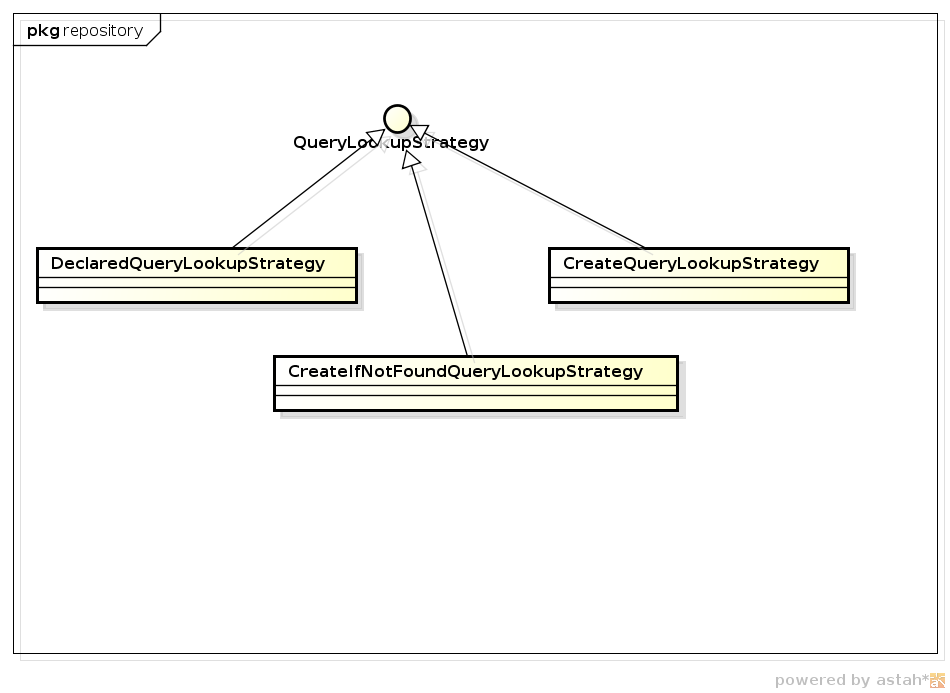 | CreateQueryLookupStrategy:對(duì)應(yīng)repositories元素query-lookup-strategy的create值,主要針對(duì)method query方式
DeclaredQueryLookupStrategy:對(duì)應(yīng)use-declared-query值,主要針對(duì)帶有@Query注解的查詢方式
CreateIfNotFoundQueryLookupStrategy:對(duì)應(yīng)create-if-not-found值(default值),結(jié)合了上述兩種方式 |
Bean的創(chuàng)建
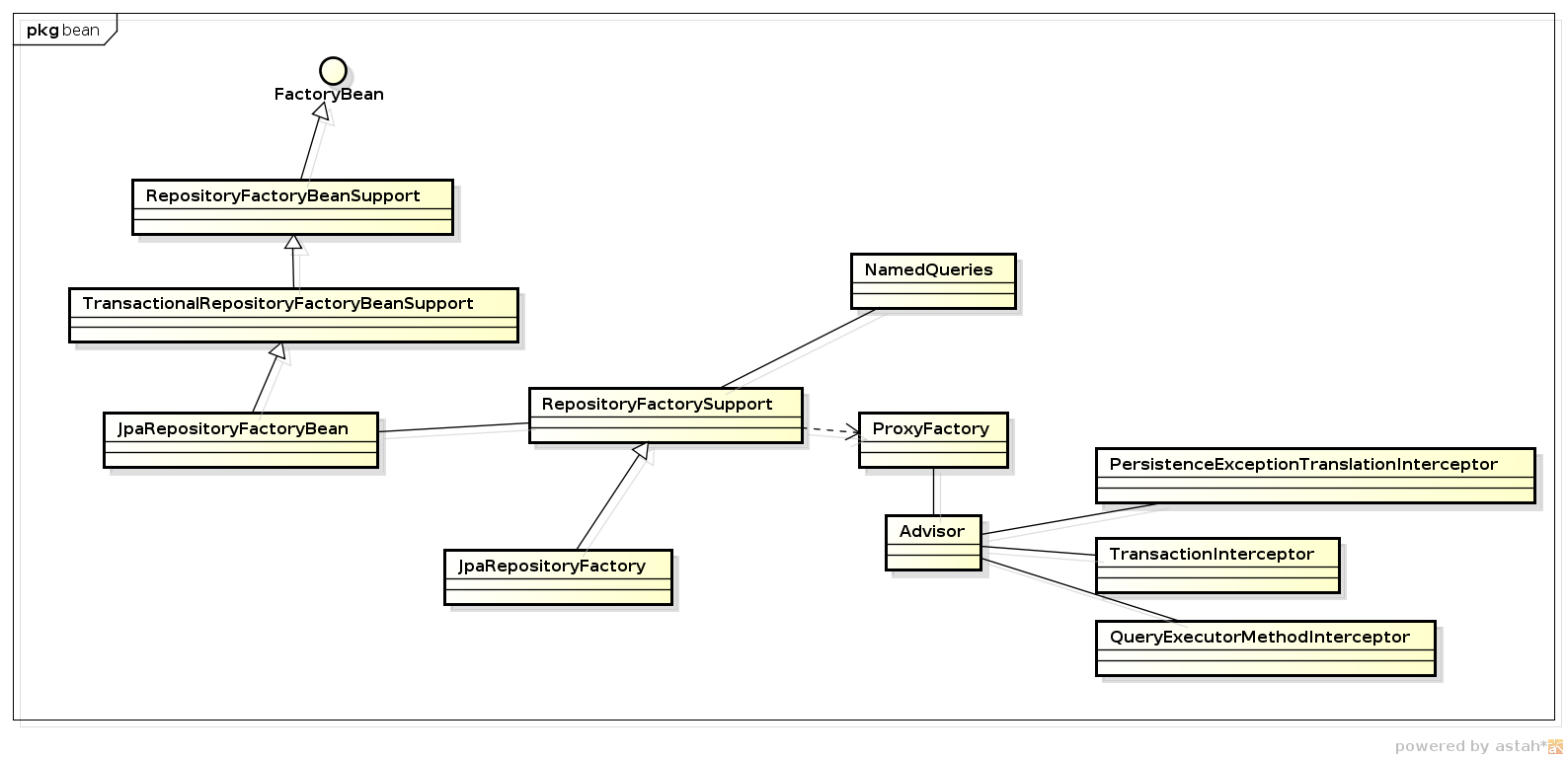
|
主要包含兩個(gè)類
RepositoryFactoryBeanSupport, Spring Factory Bean,用于創(chuàng)建Reposiory代理類。其本身并不真正做代理的事情,只是接受Spring的配置,具體交由RepositoryFactorySupport進(jìn)行代理工作
RepositoryFactorySupport, 真正做Repository代理工作,根據(jù)JpaRepositoryFactoryBean的定義找到TargetClass:SimpleJpaRepository實(shí)現(xiàn)類,中間加入3個(gè)攔截器,一個(gè)是異常翻譯,一個(gè)是事務(wù)管理,最后一個(gè)是QueryExecutorMethodInterceptor。
QueryExecutorMethodInterceptor是個(gè)重點(diǎn),主要做特定的Query(查詢語句)的操作。 |
Repository執(zhí)行
1. 主要執(zhí)行類
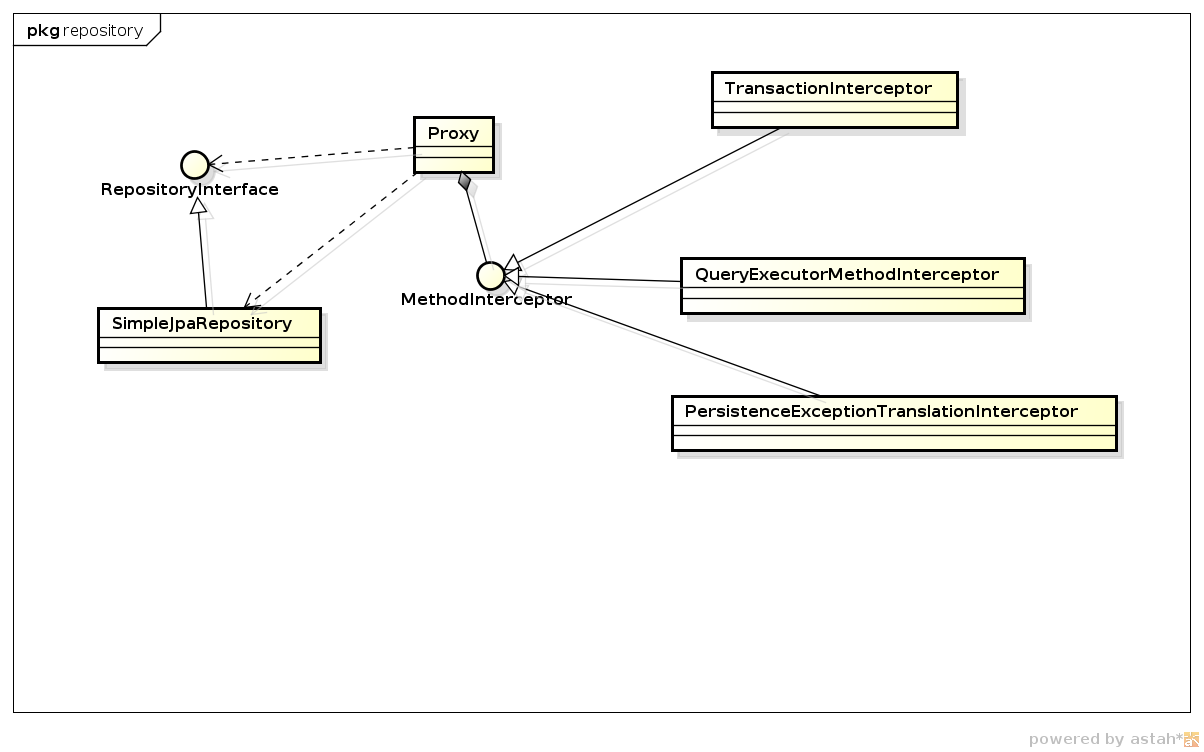 |
在看上面Bean定義的時(shí)候,其實(shí)已經(jīng)明白了執(zhí)行過程:
1. 將JPA CRUD規(guī)范相關(guān)的方法交給SimpleJpaRepository這個(gè)類執(zhí)行
2. 將特殊查詢相關(guān)的交給QueryExecutorMethodInterceptor執(zhí)行。主要做自定義實(shí)現(xiàn)的部分,method query部分和named query部分。
具體查詢類詳見下圖。 |
2. 查詢相關(guān)
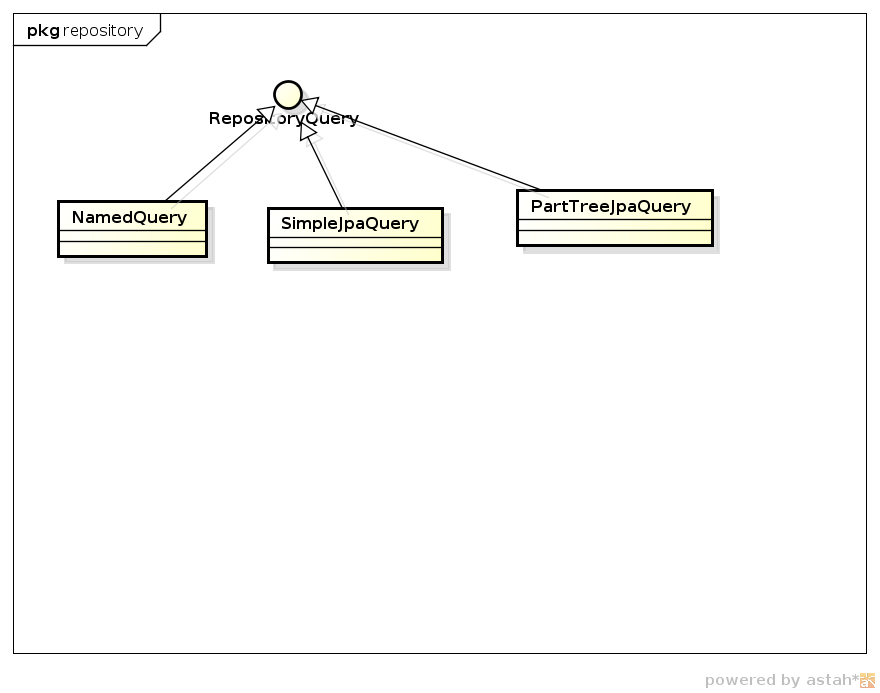 | 主要支持NamedQuery和JPA Query。 |
主要執(zhí)行代碼
QueryExecutorMethodInterceptor#invoke(MethodInvocation invocation)
1 public Object invoke(MethodInvocation invocation) throws Throwable {
2
3 Method method = invocation.getMethod();
4
5 if (isCustomMethodInvocation(invocation)) {
6 Method actualMethod = repositoryInformation.getTargetClassMethod(method);
7 makeAccessible(actualMethod);
8 return executeMethodOn(customImplementation, actualMethod,
9 invocation.getArguments());
10 }
11
12 if (hasQueryFor(method)) {
13 return queries.get(method).execute(invocation.getArguments());
14 }
15
16 // Lookup actual method as it might be redeclared in the interface
17 // and we have to use the repository instance nevertheless
18 Method actualMethod = repositoryInformation.getTargetClassMethod(method);
19 return executeMethodOn(target, actualMethod,
20 invocation.getArguments());
21 }
主要分3個(gè)步驟:
1. 如果配置文件中執(zhí)行了接口類的實(shí)現(xiàn)類,則直接交給實(shí)現(xiàn)類處理
2. 判斷是查詢方法的,交給RepositoryQuery實(shí)現(xiàn),具體又分:NamedQuery,SimpleJpaQuery,PartTreeJpaQuery
3. 不屬于上述兩個(gè),則直接將其交給真正的targetClass執(zhí)行,在JPA中,就交給SimpleJpaRepository執(zhí)行。
本文并沒有做詳細(xì)的分析,只是將核心的組件類一一點(diǎn)到,方便大家自行深入了解代碼。